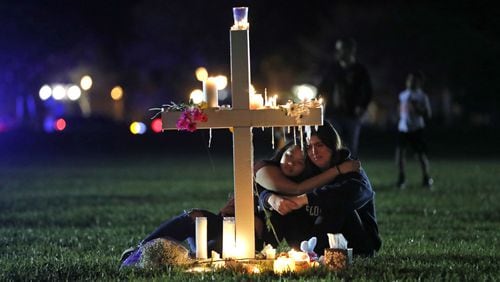Two fathers who lost children in the mass shooting at Marjory Stoneman Douglas High School in Parkland, Fl., wrote a letter nominating the South Florida Sun Sentinel for journalism's top prize, the Pulitzer. The fathers say the newspaper revealed fatal mistakes and policies that shielded the alleged shooter from earlier criminal prosecutions while a student at the school.
I am sharing part of their nomination letter as it touches on an issue that local teachers and parents increasingly raise with me – schools are not reporting all student offenses and allowing offenders and bullies to remain on campus. Teachers contend schools fear being criticized for their discipline and suspension data so they pressure teachers to keep wrongdoers in class.
For example, a recent bullying case in Cobb led to allegations by some parents the district downplays bullying incidents. An Atlanta Journal-Constitution analysis of Georgia Department of Education data showed Cobb with an unusually low rate of bullying.
Cobb reported roughly 75 incidents of bullying per 100,000 students in the 2017-18 school year. Cobb’s rate falls in the lowest third of all school districts in the state. Gwinnett County schools’ rate was two-thirds higher, and the DeKalb schools’ rate was eight times as high.
The Parkland shooting on Valentine’s Day last year killed 17 students and staff. Ryan Petty lost his daughter Alaina, and Andrew Pollack lost his daughter Meadow.
Nikolas Cruz, a 19-year-old former Stoneman Douglas student, is charged with multiple counts of murder and attempted murder.
In its excellent investigation, the South Florida Sun Sentinel found:
The culture of leniency allows children to engage in an endless loop of violations and second chances, creating a system where kids who commit the same offense for the 10th time may be treated like it's the first, according to records and interviews with people familiar with the process.
Cruz was suspended at least 67 days over less than a year and a half at Westglades Middle School, and his problems continued at Marjory Stoneman Douglas High School, until he finally was forced to leave.
The South Florida Sun Sentinel obtained Cruz's discipline records, reviewed discipline policies and found:
-- Students can be considered first-time offenders even if they commit the same offenses year after year.
-- The district's claim of reforming bad behavior is exaggerated.
-- Lenient discipline has an added PR benefit for the district: lower suspensions, expulsions and arrests along with rising graduation rates.
Here is an excerpt of the letter from the two fathers, which you can read in full here:
By Ryan Petty and Andrew Pollack
This was the most avoidable mass murder in American history, enabled by a sheriff's office and a school district characterized by administrative incompetence so staggering and moral corruption so deep that it took the Sun Sentinel the better part of the year the uncover it all. But long after the national media moved on to the next controversy, local reporters here kept at it.
They uncovered so much that it would be impossible for us to summarize it and link to it in a short letter. But here is one example: we raised concerns that Broward's PROMISE diversionary program, which aimed to lower student arrests, may have played a role in the shooter avoiding arrest for alleged felonies committed on campus long before the shooting. Superintendent Robert Runcie said this was a "reprehensible" question and called it "fake news" because, he said, the shooter was not referred to PROMISE while in high school.
After the news broke that he was, of course, referred to PROMISE while in middle school, the Sun Sentinel wrote an excellent exposé "Schools' culture of tolerance lets students like [the shooter] slide," about how Broward's policies allow students to commit multiple misdemeanors a year without any consequence. Having spoken to numerous teachers, we can assure you that – contra Superintendent Runcie – this was real news, and it played a significant role in enabling the murder of our children.
Shortly thereafter, the Sun Sentinel ran another searing article, "Broward school district failing to report many campus crimes to state as required." According to official reports, there was no bullying or harassment or violence or theft the year that the shooter attended Marjory Stoneman Douglas High School. That was, obviously, not true. Or, as Superintendent Runcie might say, the school district's crime data was "fake news."
While at times we wished that the Sun Sentinel had uncovered details faster, we can't quite fault them because they had to break through the school district's effort to "shut down information" and stonewall. But they kept at it, and eventually proved an active cover-up in their bombshell piece, "Hide, Spin, Deny, Threaten: How the school district tried to mask failures that led to Parkland shooting."
Later, the PR consultant hired by the school district, Sarah Brady, publicly slandered a Sun Sentinel reporter, calling him smelly and "skanky." Her remarks, delivered to chuckling applause, made it clear that she and Superintendent Runcie viewed parents of the victims as "crazies" and "the opposition."
If Americans knew the full story behind the Parkland school shooting, our nation would have united in revulsion against the incompetent, self-aggrandizing leaders who allowed this to happen and tried to cover it up. And we could have united in purpose behind reforms intended to keep students safe, rather than simply move on, a little angrier at each other than before, and wait for the next one to happen.







